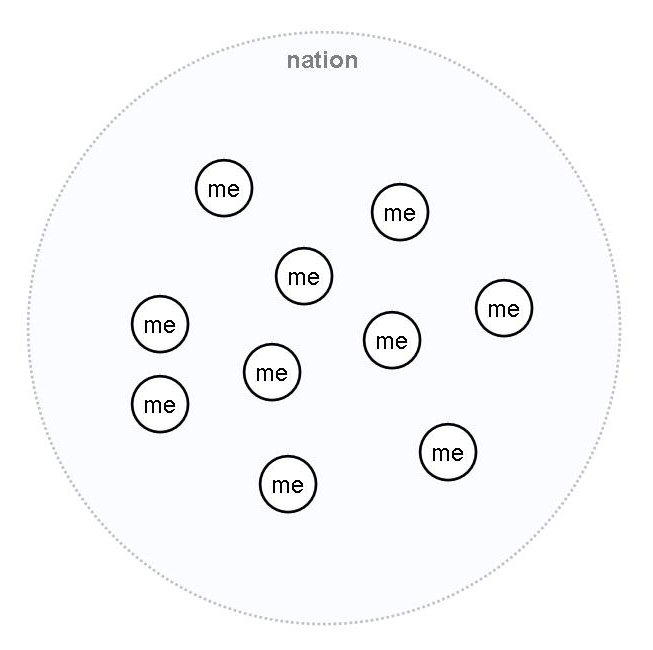Much of the story of humans and groups of humans, as well as the challenges that face America, can be told with circles.
The core of the story is an individual.
The first unit of human organization is the family.
The next unit of human organization is tribe.
Tribe is the fundamental unit of humans everywhere in the world except the United States. Tribes define the most essential social unit for almost everyone on the planet except for Americans. Tribes don’t exist in the U.S. because the nation is made up of immigrants who mixed together to create the society. Because true tribes do not exist in the U.S., it is nearly impossible for modern Americans to understand tribes and world events that are driven by tribal loyalties and conflicts.
In particular, Americans struggle to understand events in countries that were artificially formed by the colonial European empires, empires that created multitudes of artificial borders and entire countries by whim, thereby dividing ancient tribal lands and forcing disparate tribes, often ancient blood-enemies, into shared artificial nation-states.
From Kashmir to Kurdistan to nearly the entire continent of Africa, where there is trouble, it is almost always traceable back to European colonialism and the wreckage the modern world has inherited because of it.
The United States, however, avoided this trouble. From the beginning of the nation, aside from the remaining native Americans, there was no true tribe in America, so the fundamental groups-of-humans units were simpler and more conducive to a nation state with a strong national identity.
For most of its existence, the United States had a strong sense of overriding nationhood. Americans were Americans, first and foremost, because no tribal loyalties clouded or competed for the people’s identity.
That all started to change when the fundamental building block, the family unit, began to disintegrate in the mid to late 20th century. As the multi-generational family unit weakened, stratified and crumbled it was replaced by pseudo-tribes.
As the family became less and less a reliable structure in American life, pseudo-tribes filled the very basic human need for identity, status and protection. As pseudo-tribes rose in prominence, the nation state diminished in importance in terms of identity and definition.
Pseudo-tribes, such as gangs, institutions, organizations, brands and technologies came to define Americans’ identity. People self-defined themselves as members of pseudo-tribes first and Americans second, third or a very distant fourth, if at all. For instance, people would commonly identify themselves as “gardener” or “Cubs fan” or “metal head” but you would be hard pressed to find someone who would self-identify first as “American.”
In today’s America, pseudo-tribes have been replaced in dominance by bi-polarization that seeks to separate every single person into two very easily defined types, either us or them.
In today’s world of us, meaning those who “get it,” those who understand, those who are paying attention, those who are aware, those who are tuned in, those who are in touch, and those who are true believers—and them, meaning everyone else—the nation has faded into insignificance.
Although both groups, us and them, regularly trot out the flag and claim exclusive rights to true patriot-hood, they both are merely dressing up in the costumes of Americans. Their vitriolic rants about being the only true patriots, the only true Americans, ring hollow. Despite their protestations to the contrary, it is obvious to any non-aligned observer that it has nothing to do with America; it has only to do with us and them.
It is clear that in today’s world, there are only two entities. The nation has ceased to matter for either polarized group, whose only real purpose is the destruction of the opposing camp.
This leaves the few people outside the warring camps as the only ones who have any sense of nationhood, the only sense of what it used to be like to be Americans before us and them took over.
It remains to be seen if those few who remain outside the warring camps can rebuild the nation after the polarized combatants treat the country as collateral damage in their efforts to annihilate their opponents. At the rate the nation is devolving into partisan warfare, there may not be much left to work with.
While there is little doubt that individual people will survive the conflict, it is unknown if they will be merely individual circles or if the nation will survive to encompass them.

That is for me too much of the word me. On the road to enlightenment, have we stalled out at defining me instead of losing the mego? Are we unable to grasp the concept of defining ourselves in the eyes of those we interact with instead of building a gap between?
Many of the attributes of tribal culture are essential to defining the behavior and morals of those societies. Tribe members are knit together by common goals and educating the next generation to the group practices i.e. community. The most imperative reason for community is basic survival, which we homogenous nations can’t begin to image. The want for basic needs has been diminished in the land of plentiful comfort and health, replaced by the need to define who me is. I don’t want you to see the real me, just my worldly image that I create. This philosophy is as hollow as a tribal drum.
So, who needs me, you do. Why, because I need you so we can redefine a tribal community that survives me and you. We don’t need to follow the buffalo over the cliff.
Jack,
Thank you for your eloquent and insightful comment.
I am in complete agreement with you. Our observations of other cultures demonstrate that the transition of American culture from one focused primarily on community and shared goals/challenges to one focused nearly exclusively on the individual has yielded multiple negative near- and long-term effects.
Doug